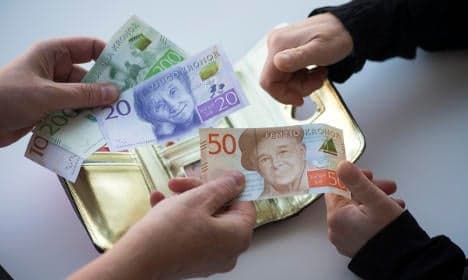Sweden holds on to record low interest rate

Sweden's national bank (the Riksbank) has announced that the nation's record low key interest rate will remain unchanged at -0.35 percent.
The Riksbank has also said it is expanding the country's bond-buying programme, with a further 65 billion kronor ($766 million) spent on the project.
The Nordic nation first slashed its interest rate – the repo – below zero in February in a landmark decision. It's national bank continued to cut rates in subsequent months, with the -0.35 rate introduced in July.
The Riksbank is hoping that its financial strategy will boost inflation in order to raise the price of everyday goods and services in Sweden which have been stagnant for two years. It has argued that this in turn will improve the country's economic prospects.
In a statement following Wednesday's announcement, the bank said that "economic activity is strengthening and inflation is showing a clear upward trend".
The bank said that inflation was still on course to be close to two percent in 2016.
However it explained that it was keeping rates low due to "considerable uncertainty regarding the strength of the global economy".
"Compared with previous forecasts, inflation abroad is deemed to be slightly lower and many central banks are expected to pursue an expansionary monetary policy for a longer time," the text continued.
The basic idea behind negative rates is to stop organisations or people from making risky investments or transactions that could impact on the wider economy.
However Wednesday's decision to hold the repo at -0.35 is bad news for savers in Sweden who will continue to see no return on any nest eggs stashed in basic savings accounts.
But those wishing to borrow money to buy properties or shares will continue to benefit from the record low rates.
Sweden's bond buying programme is a version of quantitive easing, which in simple terms involves borrowing money to inject back into the economy.
The Riksbank said that the additional bond purchases announced on Wednesday would bring the total figure bought to 200 billion kronor by the end of 2016.
The krona was stable after the announcement but the Swedish market continued to fall, having previously experienced jitters following a forecast from the National Debt Office.
Comments
See Also
The Riksbank has also said it is expanding the country's bond-buying programme, with a further 65 billion kronor ($766 million) spent on the project.
The Nordic nation first slashed its interest rate – the repo – below zero in February in a landmark decision. It's national bank continued to cut rates in subsequent months, with the -0.35 rate introduced in July.
The Riksbank is hoping that its financial strategy will boost inflation in order to raise the price of everyday goods and services in Sweden which have been stagnant for two years. It has argued that this in turn will improve the country's economic prospects.
In a statement following Wednesday's announcement, the bank said that "economic activity is strengthening and inflation is showing a clear upward trend".
The bank said that inflation was still on course to be close to two percent in 2016.
However it explained that it was keeping rates low due to "considerable uncertainty regarding the strength of the global economy".
"Compared with previous forecasts, inflation abroad is deemed to be slightly lower and many central banks are expected to pursue an expansionary monetary policy for a longer time," the text continued.
The basic idea behind negative rates is to stop organisations or people from making risky investments or transactions that could impact on the wider economy.
However Wednesday's decision to hold the repo at -0.35 is bad news for savers in Sweden who will continue to see no return on any nest eggs stashed in basic savings accounts.
But those wishing to borrow money to buy properties or shares will continue to benefit from the record low rates.
Sweden's bond buying programme is a version of quantitive easing, which in simple terms involves borrowing money to inject back into the economy.
The Riksbank said that the additional bond purchases announced on Wednesday would bring the total figure bought to 200 billion kronor by the end of 2016.
The krona was stable after the announcement but the Swedish market continued to fall, having previously experienced jitters following a forecast from the National Debt Office.
Join the conversation in our comments section below. Share your own views and experience and if you have a question or suggestion for our journalists then email us at [email protected].
Please keep comments civil, constructive and on topic – and make sure to read our terms of use before getting involved.
Please log in here to leave a comment.